Enterprise Data Architect Resume Examples

Jul 18, 2024
|
12 min read
"Frame your future: Crafting a standout enterprise data architect resume that maps out your skills and experience"
Rated by 348 people
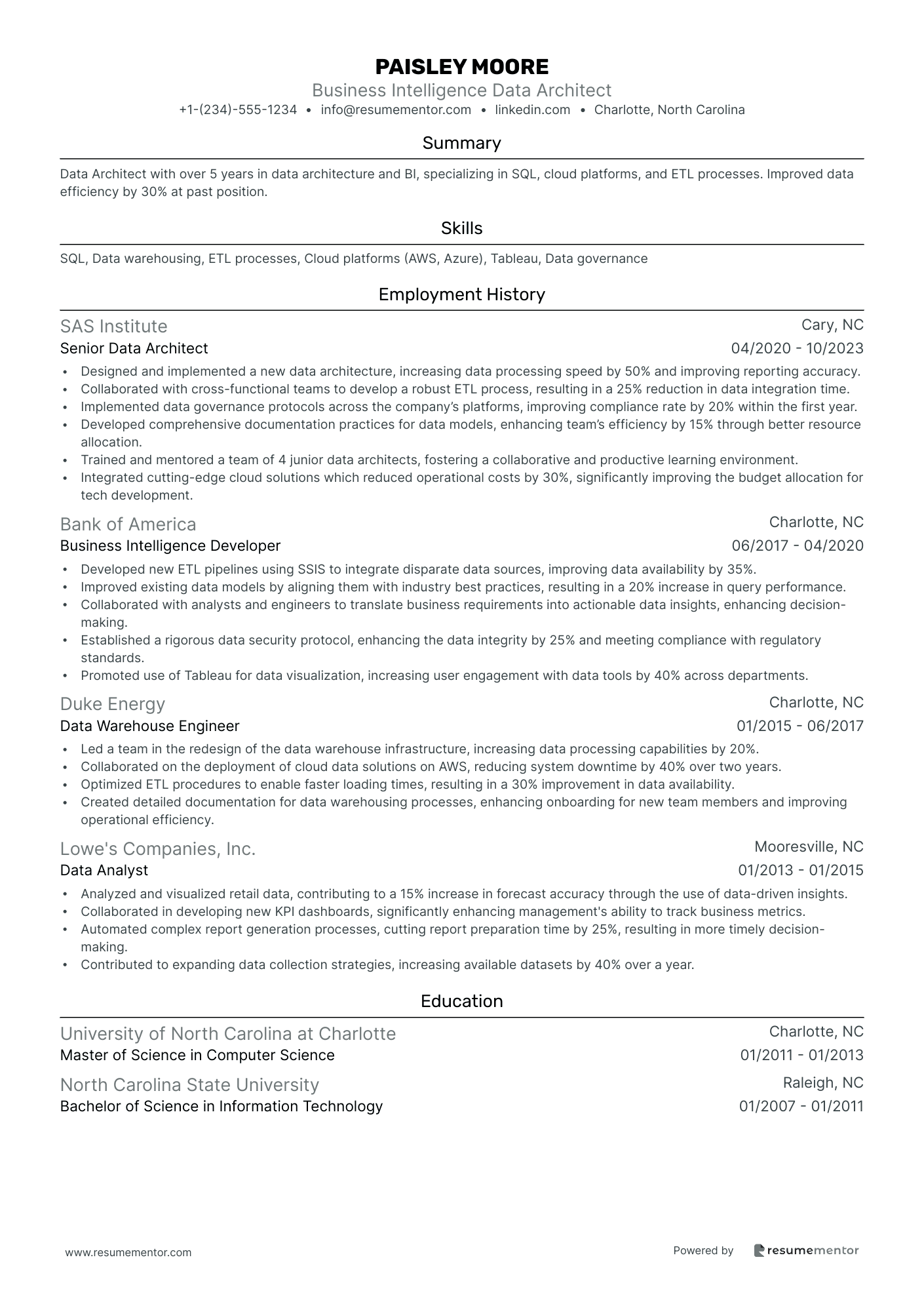
Business Intelligence Data Architect
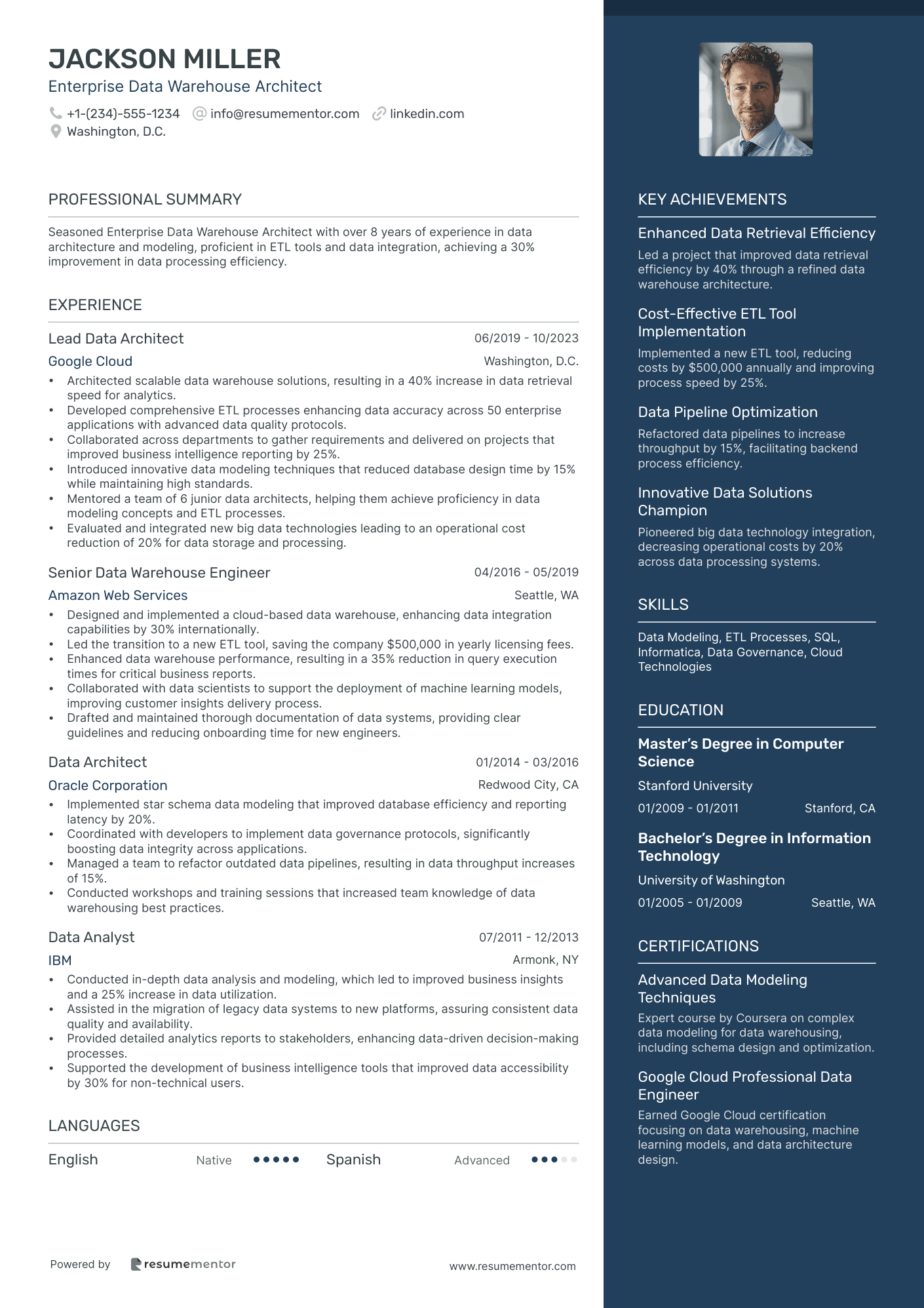
Enterprise Data Warehouse Architect
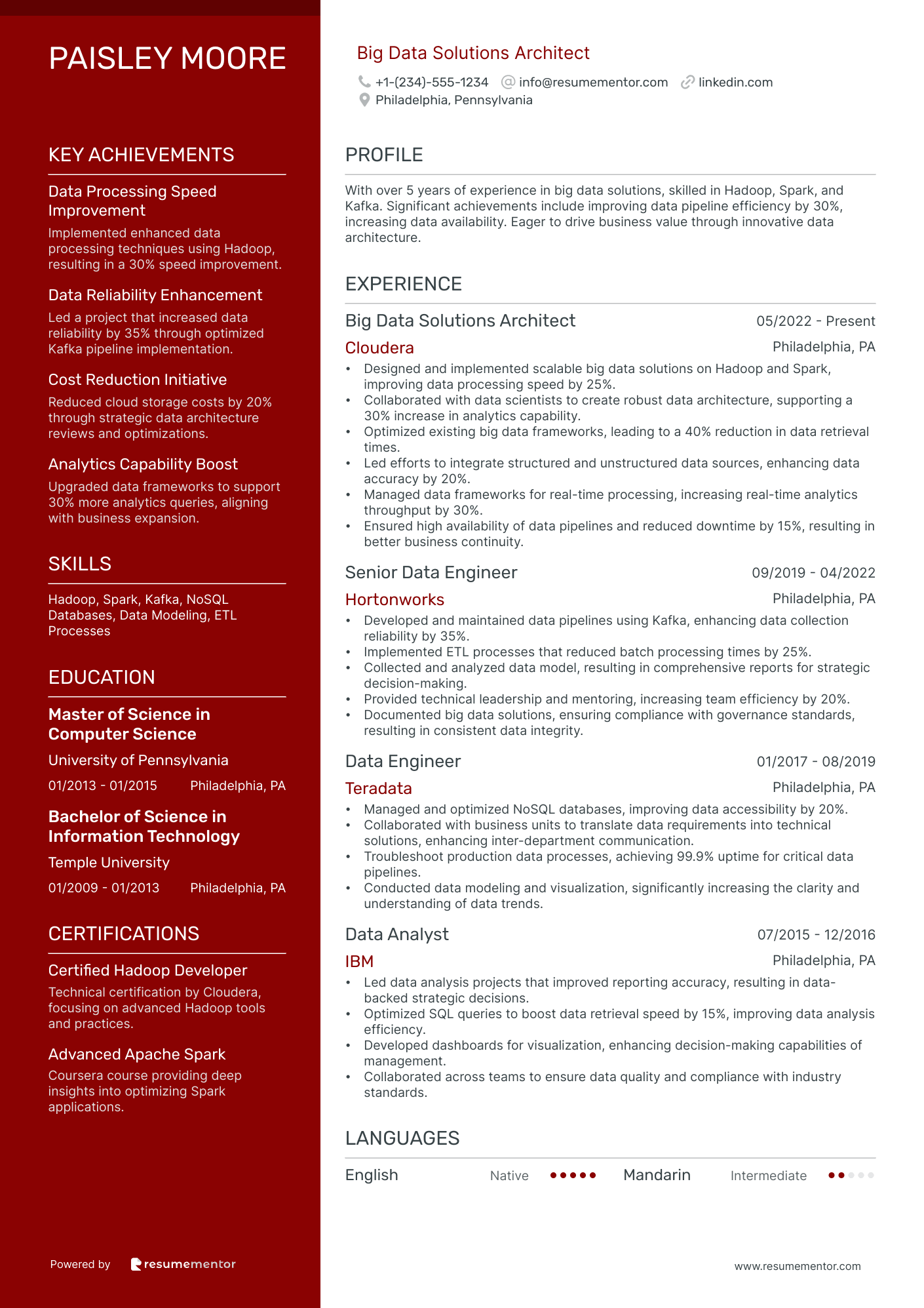
Big Data Solutions Architect
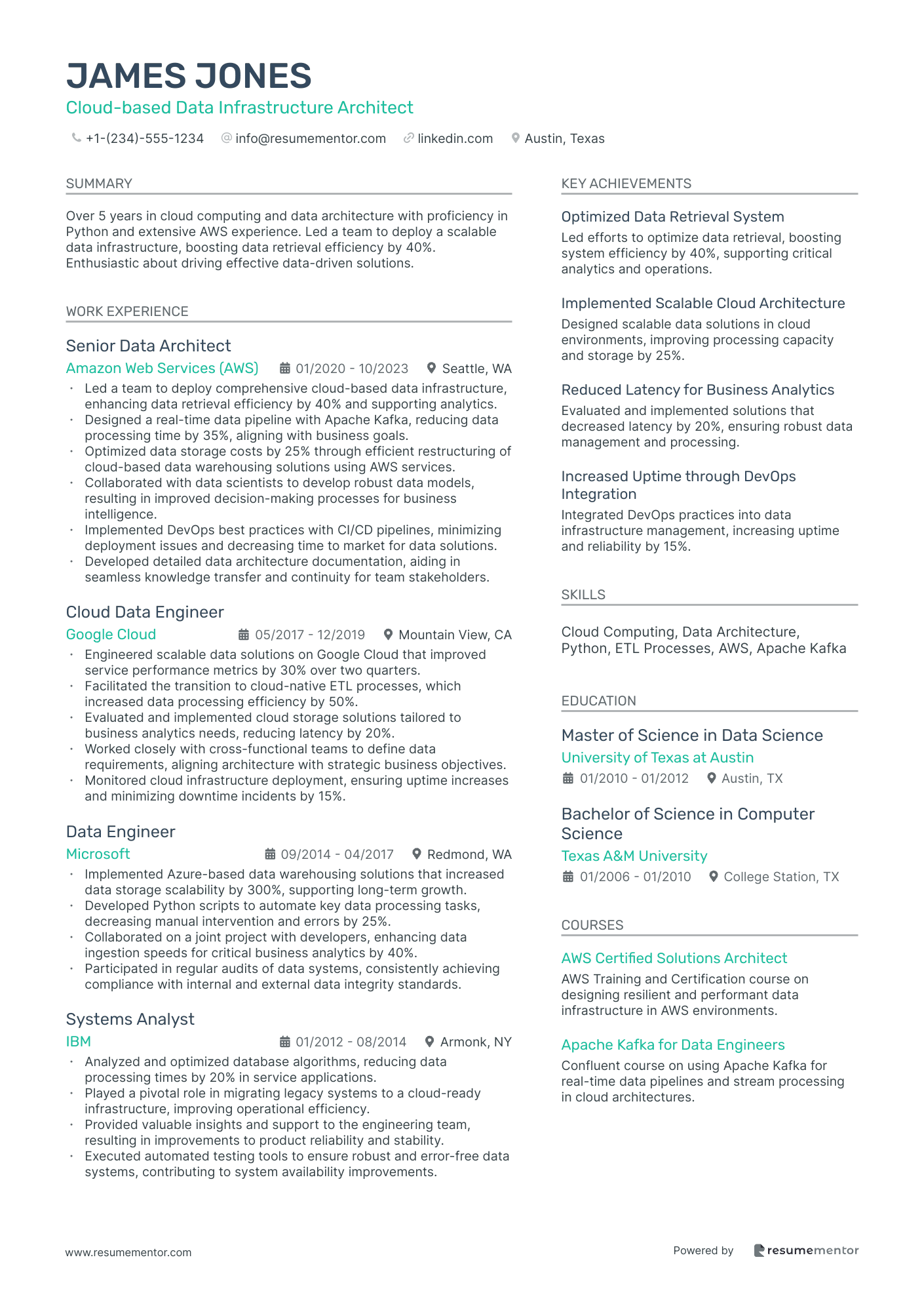
Cloud-based Data Infrastructure Architect
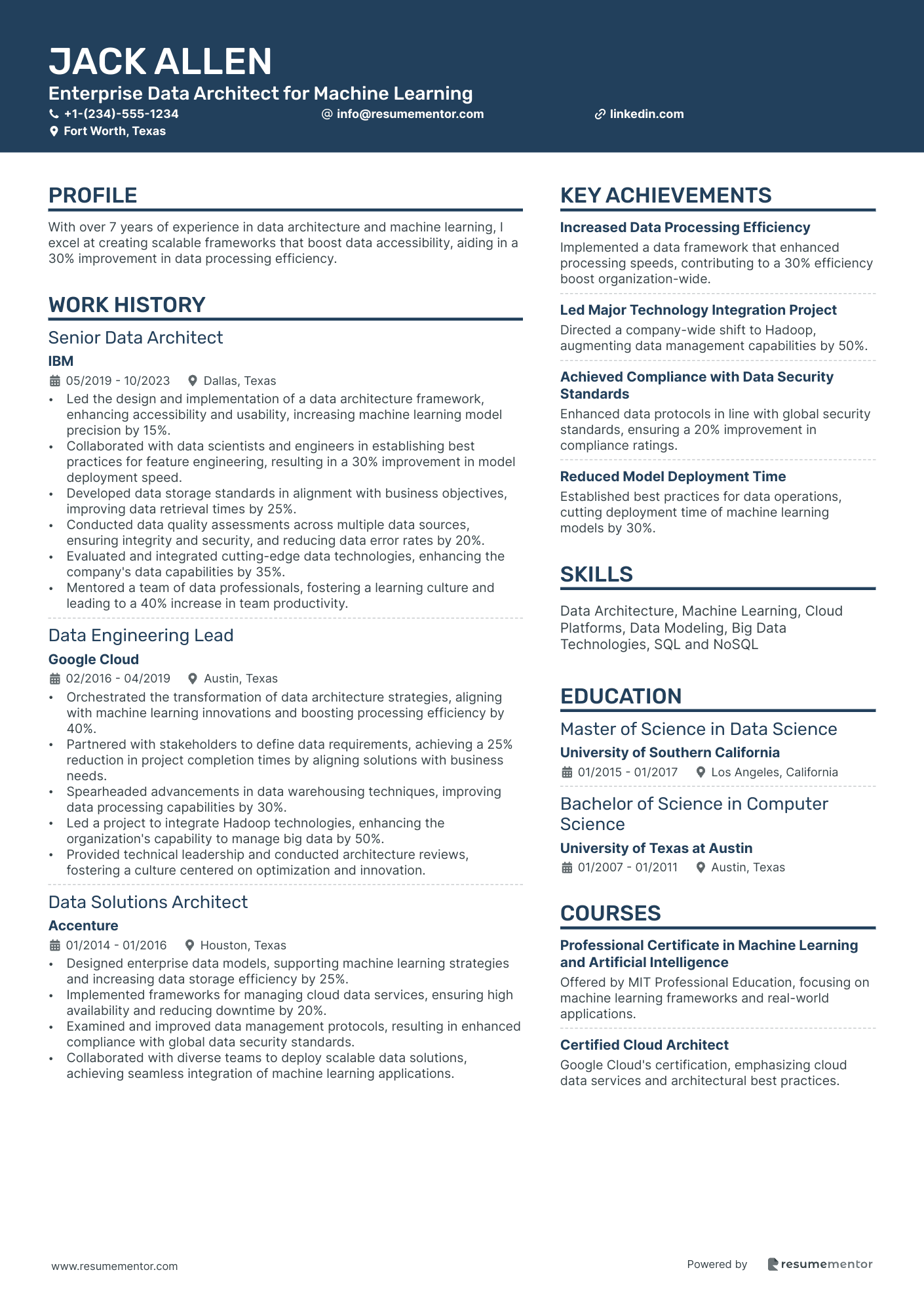
Enterprise Data Architect for Machine Learning
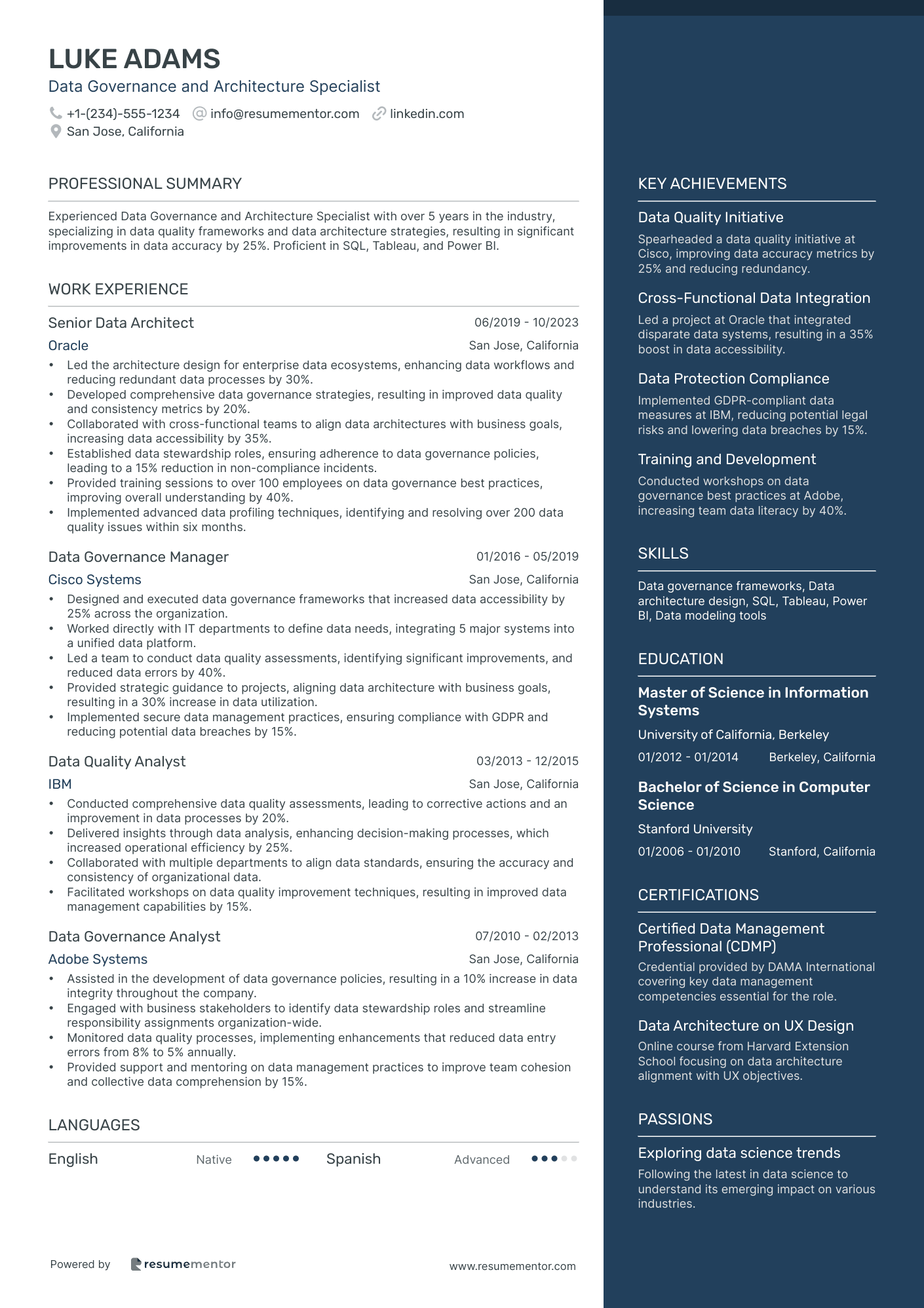
Data Governance and Architecture Specialist
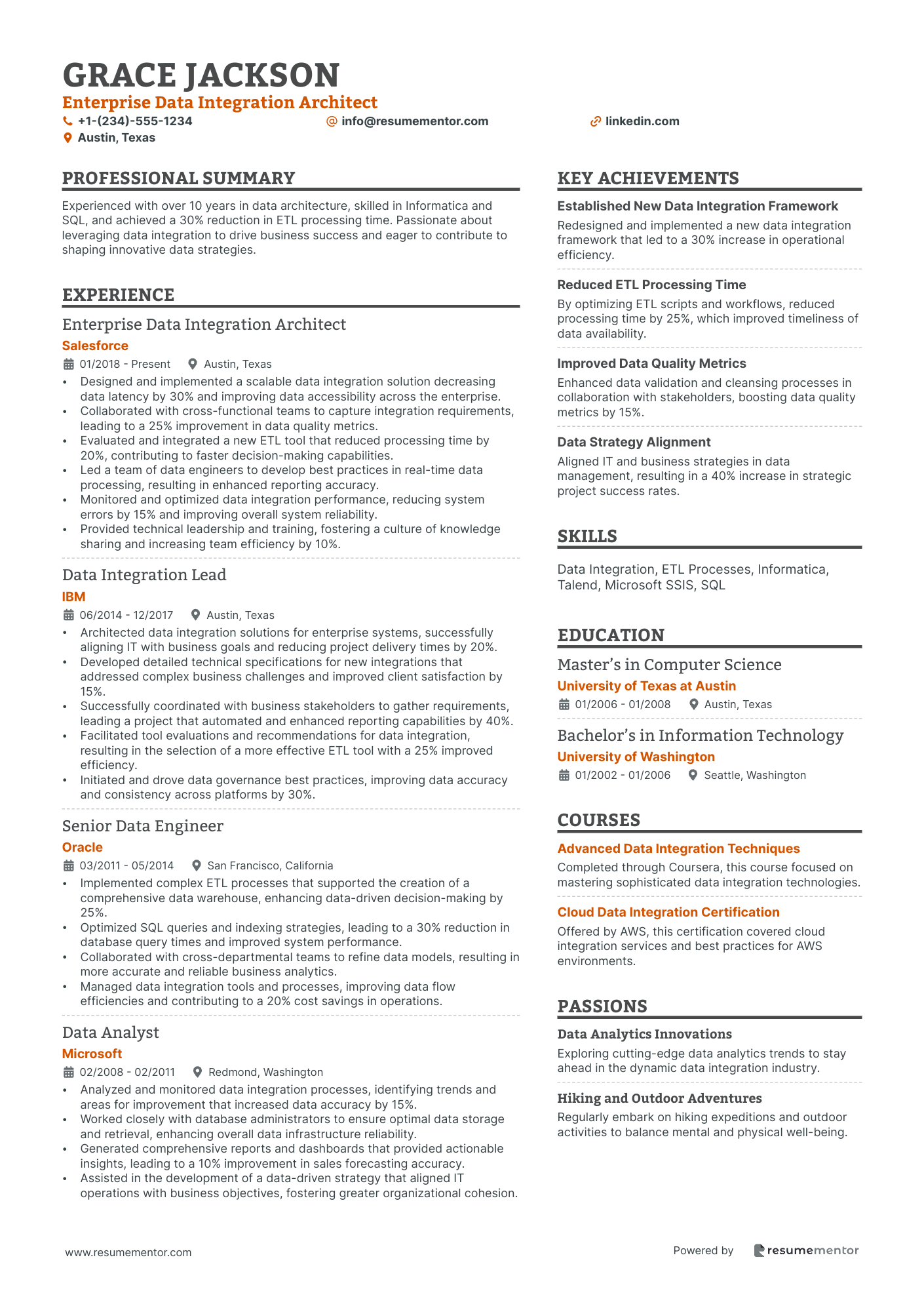
Enterprise Data Integration Architect
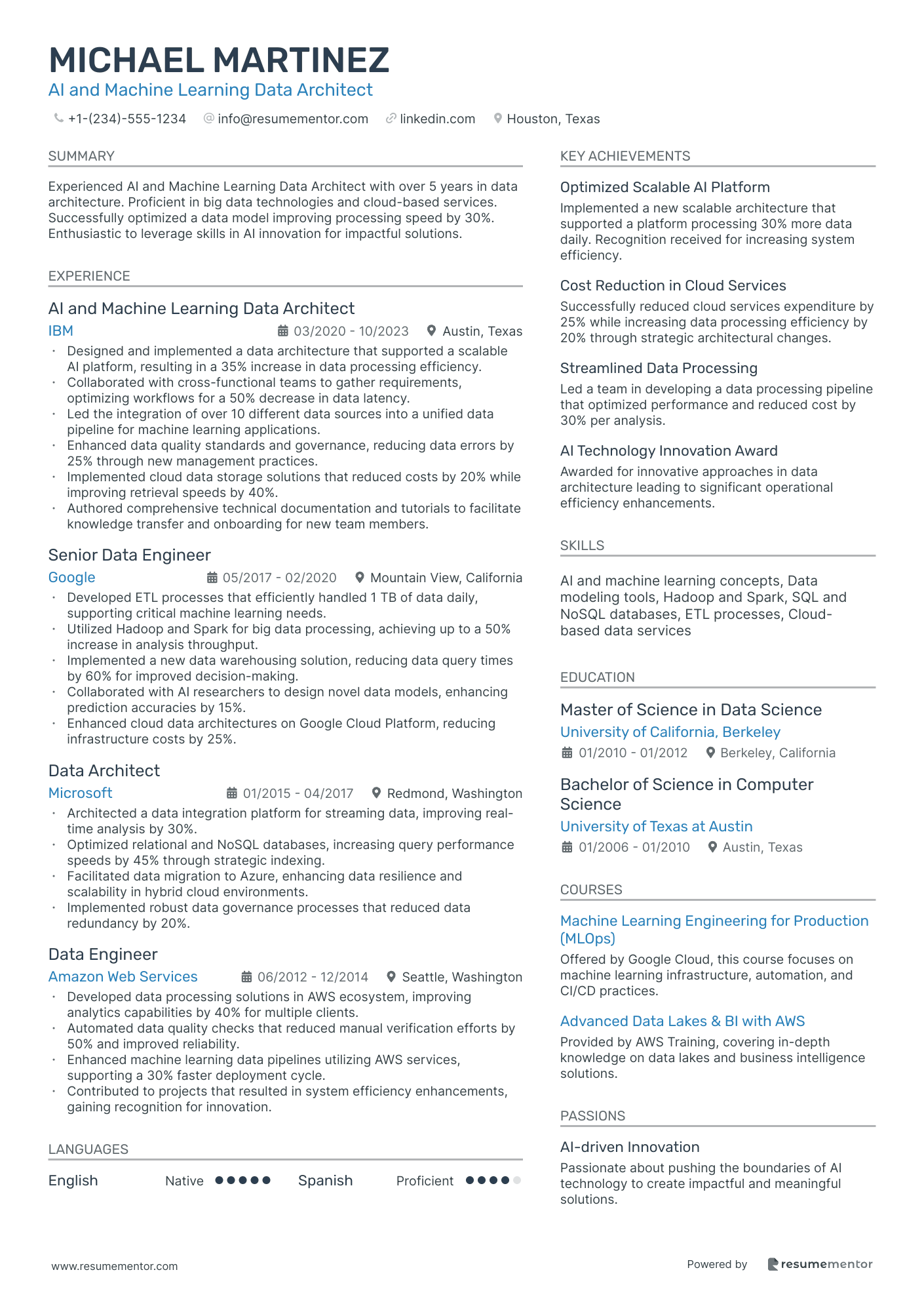
AI and Machine Learning Data Architect
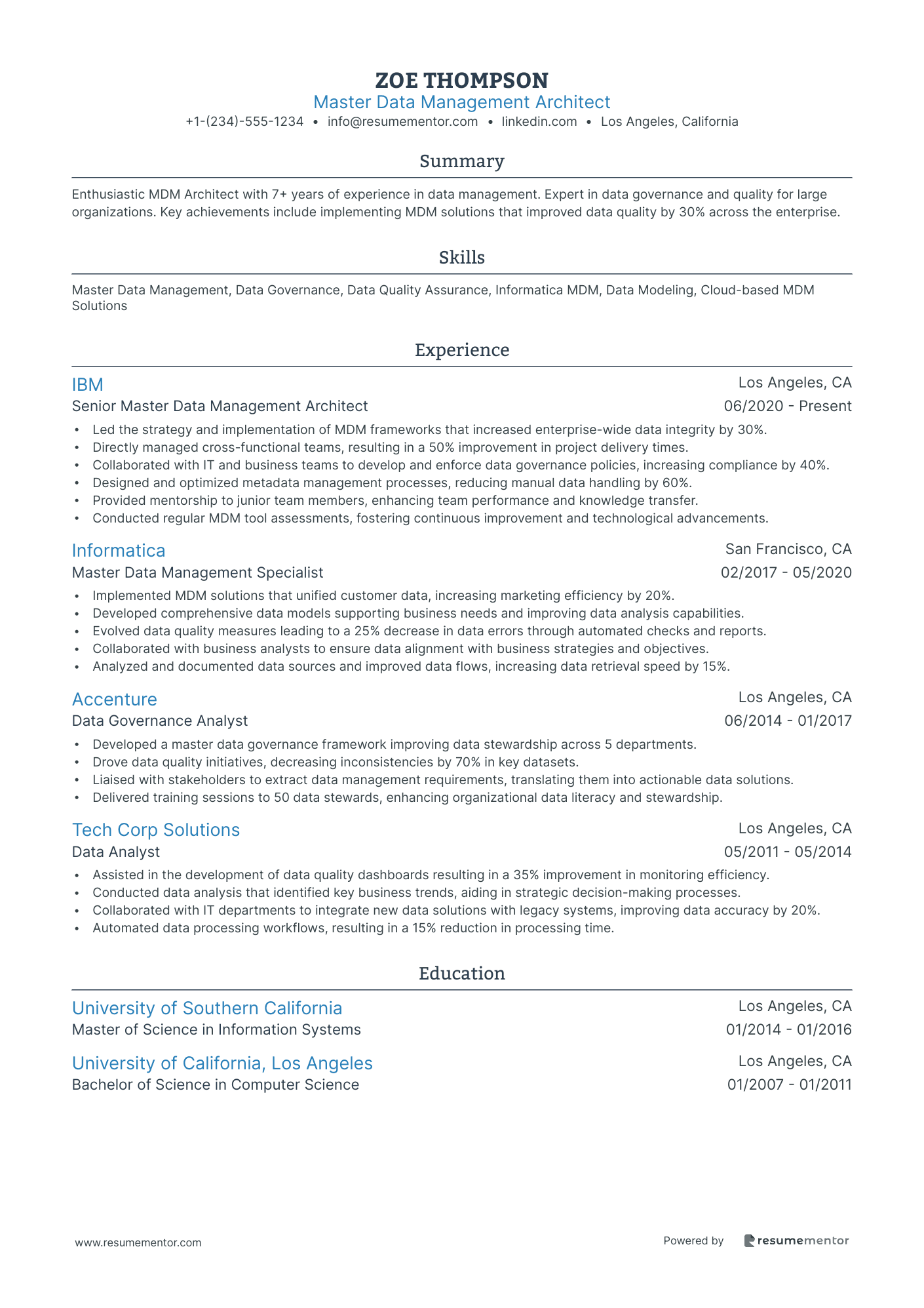
Master Data Management Architect
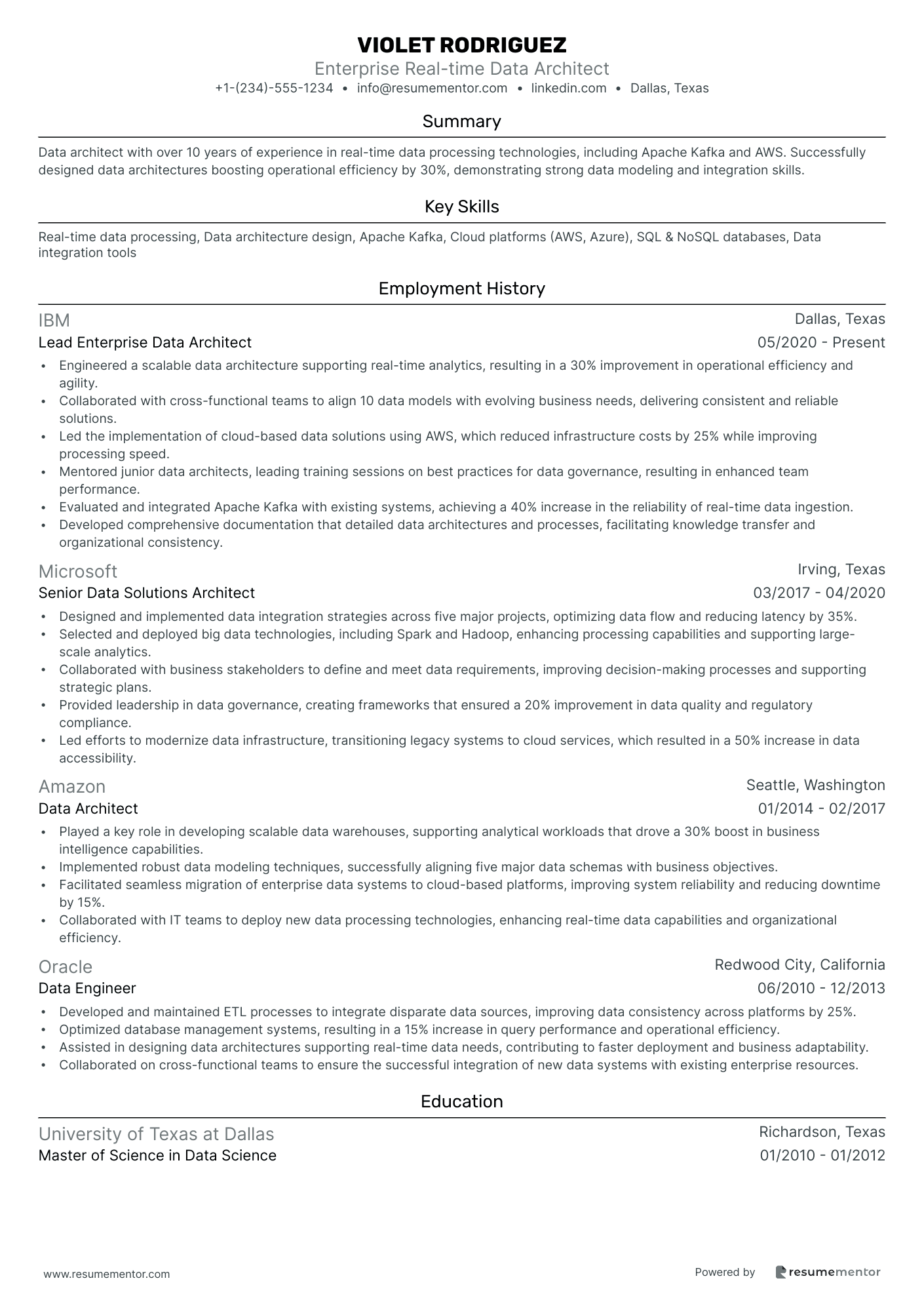
Enterprise Real-time Data Architect

Business Intelligence Data Architect resume sample
- •Designed and implemented a new data architecture, increasing data processing speed by 50% and improving reporting accuracy.
- •Collaborated with cross-functional teams to develop a robust ETL process, resulting in a 25% reduction in data integration time.
- •Implemented data governance protocols across the company’s platforms, improving compliance rate by 20% within the first year.
- •Developed comprehensive documentation practices for data models, enhancing team’s efficiency by 15% through better resource allocation.
- •Trained and mentored a team of 4 junior data architects, fostering a collaborative and productive learning environment.
- •Integrated cutting-edge cloud solutions which reduced operational costs by 30%, significantly improving the budget allocation for tech development.
- •Developed new ETL pipelines using SSIS to integrate disparate data sources, improving data availability by 35%.
- •Improved existing data models by aligning them with industry best practices, resulting in a 20% increase in query performance.
- •Collaborated with analysts and engineers to translate business requirements into actionable data insights, enhancing decision-making.
- •Established a rigorous data security protocol, enhancing the data integrity by 25% and meeting compliance with regulatory standards.
- •Promoted use of Tableau for data visualization, increasing user engagement with data tools by 40% across departments.
- •Led a team in the redesign of the data warehouse infrastructure, increasing data processing capabilities by 20%.
- •Collaborated on the deployment of cloud data solutions on AWS, reducing system downtime by 40% over two years.
- •Optimized ETL procedures to enable faster loading times, resulting in a 30% improvement in data availability.
- •Created detailed documentation for data warehousing processes, enhancing onboarding for new team members and improving operational efficiency.
- •Analyzed and visualized retail data, contributing to a 15% increase in forecast accuracy through the use of data-driven insights.
- •Collaborated in developing new KPI dashboards, significantly enhancing management's ability to track business metrics.
- •Automated complex report generation processes, cutting report preparation time by 25%, resulting in more timely decision-making.
- •Contributed to expanding data collection strategies, increasing available datasets by 40% over a year.
Enterprise Data Warehouse Architect resume sample
- •Architected scalable data warehouse solutions, resulting in a 40% increase in data retrieval speed for analytics.
- •Developed comprehensive ETL processes enhancing data accuracy across 50 enterprise applications with advanced data quality protocols.
- •Collaborated across departments to gather requirements and delivered on projects that improved business intelligence reporting by 25%.
- •Introduced innovative data modeling techniques that reduced database design time by 15% while maintaining high standards.
- •Mentored a team of 6 junior data architects, helping them achieve proficiency in data modeling concepts and ETL processes.
- •Evaluated and integrated new big data technologies leading to an operational cost reduction of 20% for data storage and processing.
- •Designed and implemented a cloud-based data warehouse, enhancing data integration capabilities by 30% internationally.
- •Led the transition to a new ETL tool, saving the company $500,000 in yearly licensing fees.
- •Enhanced data warehouse performance, resulting in a 35% reduction in query execution times for critical business reports.
- •Collaborated with data scientists to support the deployment of machine learning models, improving customer insights delivery process.
- •Drafted and maintained thorough documentation of data systems, providing clear guidelines and reducing onboarding time for new engineers.
- •Implemented star schema data modeling that improved database efficiency and reporting latency by 20%.
- •Coordinated with developers to implement data governance protocols, significantly boosting data integrity across applications.
- •Managed a team to refactor outdated data pipelines, resulting in data throughput increases of 15%.
- •Conducted workshops and training sessions that increased team knowledge of data warehousing best practices.
- •Conducted in-depth data analysis and modeling, which led to improved business insights and a 25% increase in data utilization.
- •Assisted in the migration of legacy data systems to new platforms, assuring consistent data quality and availability.
- •Provided detailed analytics reports to stakeholders, enhancing data-driven decision-making processes.
- •Supported the development of business intelligence tools that improved data accessibility by 30% for non-technical users.
Big Data Solutions Architect resume sample
- •Designed and implemented scalable big data solutions on Hadoop and Spark, improving data processing speed by 25%.
- •Collaborated with data scientists to create robust data architecture, supporting a 30% increase in analytics capability.
- •Optimized existing big data frameworks, leading to a 40% reduction in data retrieval times.
- •Led efforts to integrate structured and unstructured data sources, enhancing data accuracy by 20%.
- •Managed data frameworks for real-time processing, increasing real-time analytics throughput by 30%.
- •Ensured high availability of data pipelines and reduced downtime by 15%, resulting in better business continuity.
- •Developed and maintained data pipelines using Kafka, enhancing data collection reliability by 35%.
- •Implemented ETL processes that reduced batch processing times by 25%.
- •Collected and analyzed data model, resulting in comprehensive reports for strategic decision-making.
- •Provided technical leadership and mentoring, increasing team efficiency by 20%.
- •Documented big data solutions, ensuring compliance with governance standards, resulting in consistent data integrity.
- •Managed and optimized NoSQL databases, improving data accessibility by 20%.
- •Collaborated with business units to translate data requirements into technical solutions, enhancing inter-department communication.
- •Troubleshoot production data processes, achieving 99.9% uptime for critical data pipelines.
- •Conducted data modeling and visualization, significantly increasing the clarity and understanding of data trends.
- •Led data analysis projects that improved reporting accuracy, resulting in data-backed strategic decisions.
- •Optimized SQL queries to boost data retrieval speed by 15%, improving data analysis efficiency.
- •Developed dashboards for visualization, enhancing decision-making capabilities of management.
- •Collaborated across teams to ensure data quality and compliance with industry standards.
Cloud-based Data Infrastructure Architect resume sample
- •Led a team to deploy comprehensive cloud-based data infrastructure, enhancing data retrieval efficiency by 40% and supporting analytics.
- •Designed a real-time data pipeline with Apache Kafka, reducing data processing time by 35%, aligning with business goals.
- •Optimized data storage costs by 25% through efficient restructuring of cloud-based data warehousing solutions using AWS services.
- •Collaborated with data scientists to develop robust data models, resulting in improved decision-making processes for business intelligence.
- •Implemented DevOps best practices with CI/CD pipelines, minimizing deployment issues and decreasing time to market for data solutions.
- •Developed detailed data architecture documentation, aiding in seamless knowledge transfer and continuity for team stakeholders.
- •Engineered scalable data solutions on Google Cloud that improved service performance metrics by 30% over two quarters.
- •Facilitated the transition to cloud-native ETL processes, which increased data processing efficiency by 50%.
- •Evaluated and implemented cloud storage solutions tailored to business analytics needs, reducing latency by 20%.
- •Worked closely with cross-functional teams to define data requirements, aligning architecture with strategic business objectives.
- •Monitored cloud infrastructure deployment, ensuring uptime increases and minimizing downtime incidents by 15%.
- •Implemented Azure-based data warehousing solutions that increased data storage scalability by 300%, supporting long-term growth.
- •Developed Python scripts to automate key data processing tasks, decreasing manual intervention and errors by 25%.
- •Collaborated on a joint project with developers, enhancing data ingestion speeds for critical business analytics by 40%.
- •Participated in regular audits of data systems, consistently achieving compliance with internal and external data integrity standards.
- •Analyzed and optimized database algorithms, reducing data processing times by 20% in service applications.
- •Played a pivotal role in migrating legacy systems to a cloud-ready infrastructure, improving operational efficiency.
- •Provided valuable insights and support to the engineering team, resulting in improvements to product reliability and stability.
- •Executed automated testing tools to ensure robust and error-free data systems, contributing to system availability improvements.
Enterprise Data Architect for Machine Learning resume sample
- •Led the design and implementation of a data architecture framework, enhancing accessibility and usability, increasing machine learning model precision by 15%.
- •Collaborated with data scientists and engineers in establishing best practices for feature engineering, resulting in a 30% improvement in model deployment speed.
- •Developed data storage standards in alignment with business objectives, improving data retrieval times by 25%.
- •Conducted data quality assessments across multiple data sources, ensuring integrity and security, and reducing data error rates by 20%.
- •Evaluated and integrated cutting-edge data technologies, enhancing the company's data capabilities by 35%.
- •Mentored a team of data professionals, fostering a learning culture and leading to a 40% increase in team productivity.
- •Orchestrated the transformation of data architecture strategies, aligning with machine learning innovations and boosting processing efficiency by 40%.
- •Partnered with stakeholders to define data requirements, achieving a 25% reduction in project completion times by aligning solutions with business needs.
- •Spearheaded advancements in data warehousing techniques, improving data processing capabilities by 30%.
- •Led a project to integrate Hadoop technologies, enhancing the organization's capability to manage big data by 50%.
- •Provided technical leadership and conducted architecture reviews, fostering a culture centered on optimization and innovation.
- •Designed enterprise data models, supporting machine learning strategies and increasing data storage efficiency by 25%.
- •Implemented frameworks for managing cloud data services, ensuring high availability and reducing downtime by 20%.
- •Examined and improved data management protocols, resulting in enhanced compliance with global data security standards.
- •Collaborated with diverse teams to deploy scalable data solutions, achieving seamless integration of machine learning applications.
- •Analyzed and interpreted data, providing insights that led to a 10% increase in operational efficiency.
- •Automated data collection processes, resulting in a 15% reduction in manual data entry errors.
- •Developed data visualization reports, enhancing stakeholder communication and improving decision-making processes by 20%.
- •Assisted in the design of database structures, improving data retrieval times and supporting machine learning projects.
Data Governance and Architecture Specialist resume sample
- •Led the architecture design for enterprise data ecosystems, enhancing data workflows and reducing redundant data processes by 30%.
- •Developed comprehensive data governance strategies, resulting in improved data quality and consistency metrics by 20%.
- •Collaborated with cross-functional teams to align data architectures with business goals, increasing data accessibility by 35%.
- •Established data stewardship roles, ensuring adherence to data governance policies, leading to a 15% reduction in non-compliance incidents.
- •Provided training sessions to over 100 employees on data governance best practices, improving overall understanding by 40%.
- •Implemented advanced data profiling techniques, identifying and resolving over 200 data quality issues within six months.
- •Designed and executed data governance frameworks that increased data accessibility by 25% across the organization.
- •Worked directly with IT departments to define data needs, integrating 5 major systems into a unified data platform.
- •Led a team to conduct data quality assessments, identifying significant improvements, and reduced data errors by 40%.
- •Provided strategic guidance to projects, aligning data architecture with business goals, resulting in a 30% increase in data utilization.
- •Implemented secure data management practices, ensuring compliance with GDPR and reducing potential data breaches by 15%.
- •Conducted comprehensive data quality assessments, leading to corrective actions and an improvement in data processes by 20%.
- •Delivered insights through data analysis, enhancing decision-making processes, which increased operational efficiency by 25%.
- •Collaborated with multiple departments to align data standards, ensuring the accuracy and consistency of organizational data.
- •Facilitated workshops on data quality improvement techniques, resulting in improved data management capabilities by 15%.
- •Assisted in the development of data governance policies, resulting in a 10% increase in data integrity throughout the company.
- •Engaged with business stakeholders to identify data stewardship roles and streamline responsibility assignments organization-wide.
- •Monitored data quality processes, implementing enhancements that reduced data entry errors from 8% to 5% annually.
- •Provided support and mentoring on data management practices to improve team cohesion and collective data comprehension by 15%.
Enterprise Data Integration Architect resume sample
- •Designed and implemented a scalable data integration solution decreasing data latency by 30% and improving data accessibility across the enterprise.
- •Collaborated with cross-functional teams to capture integration requirements, leading to a 25% improvement in data quality metrics.
- •Evaluated and integrated a new ETL tool that reduced processing time by 20%, contributing to faster decision-making capabilities.
- •Led a team of data engineers to develop best practices in real-time data processing, resulting in enhanced reporting accuracy.
- •Monitored and optimized data integration performance, reducing system errors by 15% and improving overall system reliability.
- •Provided technical leadership and training, fostering a culture of knowledge sharing and increasing team efficiency by 10%.
- •Architected data integration solutions for enterprise systems, successfully aligning IT with business goals and reducing project delivery times by 20%.
- •Developed detailed technical specifications for new integrations that addressed complex business challenges and improved client satisfaction by 15%.
- •Successfully coordinated with business stakeholders to gather requirements, leading a project that automated and enhanced reporting capabilities by 40%.
- •Facilitated tool evaluations and recommendations for data integration, resulting in the selection of a more effective ETL tool with a 25% improved efficiency.
- •Initiated and drove data governance best practices, improving data accuracy and consistency across platforms by 30%.
- •Implemented complex ETL processes that supported the creation of a comprehensive data warehouse, enhancing data-driven decision-making by 25%.
- •Optimized SQL queries and indexing strategies, leading to a 30% reduction in database query times and improved system performance.
- •Collaborated with cross-departmental teams to refine data models, resulting in more accurate and reliable business analytics.
- •Managed data integration tools and processes, improving data flow efficiencies and contributing to a 20% cost savings in operations.
- •Analyzed and monitored data integration processes, identifying trends and areas for improvement that increased data accuracy by 15%.
- •Worked closely with database administrators to ensure optimal data storage and retrieval, enhancing overall data infrastructure reliability.
- •Generated comprehensive reports and dashboards that provided actionable insights, leading to a 10% improvement in sales forecasting accuracy.
- •Assisted in the development of a data-driven strategy that aligned IT operations with business objectives, fostering greater organizational cohesion.
AI and Machine Learning Data Architect resume sample
- •Designed and implemented a data architecture that supported a scalable AI platform, resulting in a 35% increase in data processing efficiency.
- •Collaborated with cross-functional teams to gather requirements, optimizing workflows for a 50% decrease in data latency.
- •Led the integration of over 10 different data sources into a unified data pipeline for machine learning applications.
- •Enhanced data quality standards and governance, reducing data errors by 25% through new management practices.
- •Implemented cloud data storage solutions that reduced costs by 20% while improving retrieval speeds by 40%.
- •Authored comprehensive technical documentation and tutorials to facilitate knowledge transfer and onboarding for new team members.
- •Developed ETL processes that efficiently handled 1 TB of data daily, supporting critical machine learning needs.
- •Utilized Hadoop and Spark for big data processing, achieving up to a 50% increase in analysis throughput.
- •Implemented a new data warehousing solution, reducing data query times by 60% for improved decision-making.
- •Collaborated with AI researchers to design novel data models, enhancing prediction accuracies by 15%.
- •Enhanced cloud data architectures on Google Cloud Platform, reducing infrastructure costs by 25%.
- •Architected a data integration platform for streaming data, improving real-time analysis by 30%.
- •Optimized relational and NoSQL databases, increasing query performance speeds by 45% through strategic indexing.
- •Facilitated data migration to Azure, enhancing data resilience and scalability in hybrid cloud environments.
- •Implemented robust data governance processes that reduced data redundancy by 20%.
- •Developed data processing solutions in AWS ecosystem, improving analytics capabilities by 40% for multiple clients.
- •Automated data quality checks that reduced manual verification efforts by 50% and improved reliability.
- •Enhanced machine learning data pipelines utilizing AWS services, supporting a 30% faster deployment cycle.
- •Contributed to projects that resulted in system efficiency enhancements, gaining recognition for innovation.
Master Data Management Architect resume sample
- •Led the strategy and implementation of MDM frameworks that increased enterprise-wide data integrity by 30%.
- •Directly managed cross-functional teams, resulting in a 50% improvement in project delivery times.
- •Collaborated with IT and business teams to develop and enforce data governance policies, increasing compliance by 40%.
- •Designed and optimized metadata management processes, reducing manual data handling by 60%.
- •Provided mentorship to junior team members, enhancing team performance and knowledge transfer.
- •Conducted regular MDM tool assessments, fostering continuous improvement and technological advancements.
- •Implemented MDM solutions that unified customer data, increasing marketing efficiency by 20%.
- •Developed comprehensive data models supporting business needs and improving data analysis capabilities.
- •Evolved data quality measures leading to a 25% decrease in data errors through automated checks and reports.
- •Collaborated with business analysts to ensure data alignment with business strategies and objectives.
- •Analyzed and documented data sources and improved data flows, increasing data retrieval speed by 15%.
- •Developed a master data governance framework improving data stewardship across 5 departments.
- •Drove data quality initiatives, decreasing inconsistencies by 70% in key datasets.
- •Liaised with stakeholders to extract data management requirements, translating them into actionable data solutions.
- •Delivered training sessions to 50 data stewards, enhancing organizational data literacy and stewardship.
- •Assisted in the development of data quality dashboards resulting in a 35% improvement in monitoring efficiency.
- •Conducted data analysis that identified key business trends, aiding in strategic decision-making processes.
- •Collaborated with IT departments to integrate new data solutions with legacy systems, improving data accuracy by 20%.
- •Automated data processing workflows, resulting in a 15% reduction in processing time.
Enterprise Real-time Data Architect resume sample
- •Engineered a scalable data architecture supporting real-time analytics, resulting in a 30% improvement in operational efficiency and agility.
- •Collaborated with cross-functional teams to align 10 data models with evolving business needs, delivering consistent and reliable solutions.
- •Led the implementation of cloud-based data solutions using AWS, which reduced infrastructure costs by 25% while improving processing speed.
- •Mentored junior data architects, leading training sessions on best practices for data governance, resulting in enhanced team performance.
- •Evaluated and integrated Apache Kafka with existing systems, achieving a 40% increase in the reliability of real-time data ingestion.
- •Developed comprehensive documentation that detailed data architectures and processes, facilitating knowledge transfer and organizational consistency.
- •Designed and implemented data integration strategies across five major projects, optimizing data flow and reducing latency by 35%.
- •Selected and deployed big data technologies, including Spark and Hadoop, enhancing processing capabilities and supporting large-scale analytics.
- •Collaborated with business stakeholders to define and meet data requirements, improving decision-making processes and supporting strategic plans.
- •Provided leadership in data governance, creating frameworks that ensured a 20% improvement in data quality and regulatory compliance.
- •Led efforts to modernize data infrastructure, transitioning legacy systems to cloud services, which resulted in a 50% increase in data accessibility.
- •Played a key role in developing scalable data warehouses, supporting analytical workloads that drove a 30% boost in business intelligence capabilities.
- •Implemented robust data modeling techniques, successfully aligning five major data schemas with business objectives.
- •Facilitated seamless migration of enterprise data systems to cloud-based platforms, improving system reliability and reducing downtime by 15%.
- •Collaborated with IT teams to deploy new data processing technologies, enhancing real-time data capabilities and organizational efficiency.
- •Developed and maintained ETL processes to integrate disparate data sources, improving data consistency across platforms by 25%.
- •Optimized database management systems, resulting in a 15% increase in query performance and operational efficiency.
- •Assisted in designing data architectures supporting real-time data needs, contributing to faster deployment and business adaptability.
- •Collaborated on cross-functional teams to ensure the successful integration of new data systems with existing enterprise resources.
Crafting a standout resume as an enterprise data architect is much like building a robust data framework; it requires precision, clarity, and careful organization. Balancing your deep technical expertise with an engaging presentation can be challenging. You need to effectively highlight your ability to design complex data systems and demonstrate leadership and strategic insight simultaneously.
Thankfully, using a resume template can simplify this task, offering a foundation that organizes your information and ensures a polished visual appeal. This makes it easier for potential employers to quickly grasp your skills and experience, drawing attention to what truly sets you apart. Consider exploring these resume templates to help shift your focus from formatting to content.
In a competitive job market, your resume should embody more than just your technical skills; it should capture your ability to solve business challenges and drive innovation. While the details of your experience are critical, remember that employers are ultimately looking for results and impact. Your resume acts as a gateway, opening doors to new opportunities and conversations about your future roles.
Envision your resume as a strategic map, akin to the data architectures you create. As you follow this guide, you'll learn how to express your background in a format that clearly communicates your value and aligns with industry expectations. By structuring your resume to meet the demands of the role, you position yourself one step closer to advancing your career.
Key Takeaways
- Crafting a standout resume for an enterprise data architect involves blending technical expertise with engaging presentation, effectively demonstrating leadership, strategic insight, and quantifiable results.
- Use a resume template to streamline the organization of your information, ensuring clarity and polished visual appeal, which simplifies the employer's ability to grasp your skills and experience.
- Reverse chronological format is recommended to highlight career growth and work experience, while maintaining consistent formatting by saving your resume as a PDF.
- Emphasize hard skills such as data modeling, cloud platforms, and enterprise systems, alongside soft skills like leadership and problem-solving, to capture your comprehensive ability in data architecture.
- Enhance your resume with sections like certifications, education, and additional sections showcasing languages, hobbies, and volunteer work to present a well-rounded view of your capabilities and interests.
What to focus on when writing your enterprise data architect resume
Your enterprise data architect resume should clearly demonstrate your ability to design solutions that enhance business efficiency. Recruiters need to see how you can seamlessly implement frameworks, manage storage, and optimize processes, which will highlight your value. To stand out, emphasize your skills in data modeling, cloud platforms, and handling large enterprise systems effectively.
How to structure your enterprise data architect resume
- Contact Information: Begin the resume with your full name, phone number, email address, and LinkedIn profile—ensure these details are clear and prominently displayed. Your contact information is crucial because it allows recruiters to reach you easily. Double-check for any typos to avoid missed opportunities. This sets the first impression and makes connecting with you straightforward.
- Professional Summary: Follow with a brief overview of your key strengths, illustrating how your expertise in areas like "data architecture," "cloud solutions," and "enterprise integration" can significantly benefit the organization—this section acts as your elevator pitch. Use active language to convey enthusiasm and competence. Tailor this part to each specific job you apply for to make a strong initial impact.
- Technical Skills: Build on your summary by listing relevant skills, such as data modeling, cloud technologies like AWS or Azure, SQL, and ETL processes—this section should reflect your core competencies. Group related skills together for a more organized presentation. Highlighting technical expertise here helps establish you as a strong candidate capable of handling complex data systems.
- Work Experience: Support your skills section with detailed accounts of your previous roles and responsibilities—this shows how you've applied your skills in real-world settings. Use bullet points to highlight your achievements, adding metrics to show impact, such as "Enhanced data processing efficiency by 30% through optimized data architectures." This detail-oriented approach helps demonstrate your effectiveness and quantifiable successes.
- Education: Complement your work experience by mentioning your degrees and relevant certifications—this underscores your foundational knowledge and commitment to professional development. Highlight academic qualifications in computer science or IT, along with data-related certifications like DAMA or CDMP, to reinforce your credibility. This section adds depth to your qualifications.
- Projects: Finally, bring together your narrative with key projects where you led data architecture initiatives—add detail to describe the scope of each project and the technologies involved. Focus on successful outcomes and the role you played. Relating past projects with potential future ones can show adaptability and problem-solving skills.
Consider this as a full overview; next, we'll delve into each section more deeply to guide you in creating a standout enterprise data architect resume.
Which resume format to choose
Crafting an effective resume as an enterprise data architect involves understanding how to present your skills and accomplishments clearly and professionally. Selecting the right resume format is crucial. The reverse chronological format is ideal because it highlights your work experience and career growth. For hiring managers, this format creates a straightforward narrative of your journey in data architecture, making it easy to see how your skills have developed over time.
Choosing an appropriate font is another important aspect. Consider using Rubik, Lato, or Montserrat. These fonts offer a modern and clean look, enhancing the professional appearance of your resume. While not overly detailed, these fonts create an impression of sophistication and contemporary style, aligning well with the forward-thinking nature of enterprise data architecture.
Ensuring your resume is easily accessible involves saving it as a PDF. PDFs preserve your format and layout, making sure your carefully crafted resume appears consistently across all devices and platforms. This reliability reflects the precision and standardization crucial in data architecture roles, ensuring your credentials are clearly conveyed.
Margins might seem like a minor detail but play a significant role in how your information is digested. Keeping margins around one inch gives your resume a balanced look. This spacing provides enough white space to enhance readability and maintain a tidy, professional appearance, allowing your achievements and qualifications to stand out without overwhelming the reader.
By fine-tuning these elements, you effectively convey the meticulous and organized approach you bring to your work as an enterprise data architect, making your resume a compelling introduction to potential employers.
How to write a quantifiable resume experience section
- •Designed a centralized data lake, seamlessly reducing data retrieval time by 40% and providing quicker access to vital information.
- •Headed a team of 10, successfully transitioning legacy systems to the cloud, which effectively slashed costs by 30% while modernizing infrastructure.
- •Collaborated closely with cross-functional teams, significantly boosting data accuracy and enhancing reporting efficiency by 25%, leading to better informed decision-making.
- •Implemented robust data governance protocols, which strengthened compliance rates by 20% and ensured data integrity across the organization.
Efficiency-Focused resume experience section
A resume experience section for an efficiency-focused enterprise data architect should clearly demonstrate how your work has led to tangible improvements. Begin each bullet point with a strong action verb that highlights your contributions, linking each accomplishment to the next. Use specific examples or figures to illustrate how you streamlined processes, reduced costs, and enhanced data quality, creating a cohesive narrative that isn’t overwhelming. By describing your role in implementing innovative solutions, you can show how your strategic thinking boosted efficiency across the board.
Select roles that underline your capacity to achieve measurable improvements. Emphasize not just what tasks you performed, but how these actions transformed the organization. This method effectively communicates your ability to create more efficient and cost-effective data processes, painting a holistic picture of your impact. Here’s a structured example to guide you:
Enterprise Data Architect
Tech Innovators Inc
January 2020 - Present
- Improved data processing speed by 30% through server upgrades and code optimization, laying the groundwork for faster, more efficient operations.
- Implemented data integration systems that cut data redundancy by 25%, simplifying workflows and enhancing overall data quality.
- Led a team in redesigning legacy data architectures, achieving 40% budget savings and demonstrating strategic foresight.
- Collaborated with IT and business units to streamline reporting tools, reducing the team's workload by 15% while fostering cross-departmental synergy.
Achievement-Focused resume experience section
A results-focused enterprise data architect resume experience section should highlight your career achievements by demonstrating how you've made a significant impact in each role. Emphasize the strategies you employed to tackle specific projects or challenges, and don't forget to include numbers, percentages, and concrete metrics to showcase your contributions. Streamlining processes, enhancing data architecture, and implementing effective systems are key areas where your actions can deliver real value. By presenting your achievements in these areas, you demonstrate your ability to solve complex problems efficiently.
It's important to use quantifiable examples that communicate your expertise and commitment clearly. Instead of vague claims, provide precise instances where your efforts led to substantial improvements in data management or architecture design. Tailoring each entry to reflect the job you're targeting ensures your experiences are both relevant and engaging. This approach shows potential employers that you are a proactive and results-driven professional, making you a standout candidate in the competitive field of data architecture.
Lead Enterprise Data Architect
Tech Innovations Inc.
June 2019 - Present
- Led a team to redesign the data architecture, improving system performance by 35%.
- Implemented a new data integration process that reduced loading times by 50%.
- Developed a data governance framework, enhancing compliance and reducing errors by 40%.
- Optimized database solutions, resulting in a 25% increase in operational efficiency.
Leadership-Focused resume experience section
A leadership-focused enterprise data architect resume experience section should clearly illustrate how your leadership positively influenced your team and projects. Start by using action words that highlight your leadership capabilities, such as "led," "developed," or "directed," which can seamlessly bridge your role with the impacts you made. Clearly explain the results of your actions, like successful project completions, efficiency improvements, or innovations introduced. These examples demonstrate not only your knack for steering initiatives but also your contribution to advancing the company’s data architecture goals.
Your bullet points should flow from how you assumed responsibility to what you achieved, making sure each point feels connected to the overarching theme of leadership. Be specific and use quantifiable details when possible, such as the size of your team, the projects you oversaw, or improvements in metrics that you spearheaded. This detail paints a coherent picture of your capability to inspire and guide a team toward achieving the enterprise’s strategic objectives, showing that your leadership style fosters both team productivity and alignment with long-term business goals.
Enterprise Data Architect
Tech Solutions Co.
Jan 2019 - Present
- Led a cross-functional team of 15 in redesigning the company's data architecture, boosting data retrieval speed by 30%.
- Created a strategic plan for cloud data migration that cut operational costs by 20%.
- Implemented a new data governance framework to ensure compliance with industry regulations.
- Mentored junior team members, leading to a 50% quicker onboarding process and improved retention.
Skills-Focused resume experience section
A skills-focused enterprise data architect resume experience section should effectively highlight your expertise by connecting your achievements and responsibilities to the overall impact on the company. Start with a brief overview of your role, explaining how you played a part in the organization's success. Use action verbs and precise metrics to demonstrate your contributions and successes clearly.
Next, convey your key achievements and skills through bullet points that communicate what sets your experience apart, especially in data management, system architecture, and strategic planning. Ensure each bullet point flows naturally from the previous one, illustrating how your abilities create value in the enterprise data architect role. Keep your language simple and focused, emphasizing your unique contributions.
Lead Data Architect
Tech Innovations Inc.
June 2018 - Present
- Designed and implemented a data governance strategy that improved data quality by 40%, enhancing overall business decisions.
- Led a team of five in consolidating data platforms, creating more efficient workflows that reduced overhead costs by 25%.
- Developed a scalable data architecture framework, effectively supporting an expanding user base and future growth.
- Collaborated with IT and business teams to integrate data solutions, providing deeper insights and improving user engagement.
Write your enterprise data architect resume summary section
A well-focused enterprise data architect resume summary should effectively showcase your unique skills and accomplishments in the field. This section must quickly explain why you're the ideal fit for the job, grabbing the employer's attention by showing how you can add value to their company. By mentioning your experience in managing data structures and highlighting successful projects, you set the stage for a compelling narrative.
This example effectively captures your relevant experience, role, and skills by aligning them with the job description. Incorporating keywords from the listing ensures your summary stands out, while showcasing leadership roles or successful projects adds impact. A concise and direct summary resonates more with recruiters, who seek candidates that can demonstrate value quickly.
Distinguishing a summary from an objective or a profile lies in its purpose. A resume objective often states career aspirations, which is more suited for entry-level roles or career changes. In contrast, a summary of qualifications lists key skills and accomplishments in bullet points. The decision to use a summary, objective, or profile depends on your career stage and goals. For an experienced professional like you, a powerful summary can create a significant impact by immediately conveying your value to potential employers. Since the summary is among the first things they read, ensuring each word counts is crucial.
Listing your enterprise data architect skills on your resume
A skills-focused enterprise data architect resume should effectively showcase your abilities and expertise. One way to do this is through a well-organized skills section that highlights both technical abilities and soft skills. Incorporate these skills into a standalone section or seamlessly integrate them throughout your experience and summary sections to ensure employers consistently notice your talents.
Your strengths should reflect a blend of technical prowess and interpersonal skills, such as communication and leadership. Hard skills, on the other hand, are specific, teachable abilities like programming and data modeling. These elements serve a dual purpose as resume keywords, aligning your qualifications with job descriptions and enhancing visibility to both automated systems and recruiters.
Here's a sample skills section for an enterprise data architect resume:
This example effectively lists crucial skills that are often sought by hiring managers for an enterprise data architect role. The targeted nature of these skills showcases a firm understanding of the field while remaining concise and aligned with common job requirements.
Best hard skills to feature on your enterprise data architect resume
Hard skills specifically highlight your technical expertise, which is essential for designing and managing complex data systems. These skills communicate your capacity to efficiently handle extensive data environments.
Hard Skills
- Data Modeling
- Data Architecture
- Database Management Systems (DBMS)
- Data Warehousing Solutions
- Cloud Platforms (e.g., AWS, Azure)
- Big Data Technologies (e.g., Hadoop, Spark)
- ETL Processes (Extract, Transform, Load)
- SQL and NoSQL Databases
- Data Governance and Compliance
- Enterprise Resource Planning (ERP) Systems
- Business Intelligence Tools
- Data Security Measures
- System Integration and Interoperability
- API Design and Development
- Performance Tuning and Optimization
Best soft skills to feature on your enterprise data architect resume
Soft skills emphasize your interpersonal abilities and adaptability in a tech-driven environment. These skills should convey your potential to lead and collaborate effectively within teams and projects.
Soft Skills
- Communication
- Problem-solving
- Strategic Thinking
- Leadership Abilities
- Teamwork and Collaboration
- Project Management
- Critical Thinking
- Flexibility and Adaptability
- Time Management
- Decision Making
- Conflict Resolution
- Attention to Detail
- Creativity and Innovation
- Analytical Skills
- Emotional Intelligence
How to include your education on your resume
The education section is a critical component of your resume, serving to showcase your academic background and its relevance to the enterprise data architect role. Tailoring this section to the job you are applying for is essential. Only include education that directly supports your ability to tackle the responsibilities of the position. When listing your degree, present the information clearly and concisely. Including a GPA is optional, but if it is above 3.5, it may bolster your qualifications. If you graduated cum laude or with other honors, acknowledge this accolade to underscore your academic success.
Here is an example of what an education section should not look like:
Now, let's see an ideal example:
- •Graduated cum laude
This second example is well-crafted because it aligns with the skills and background required for an enterprise data architect. The degree is relevant, the GPA and honors are included, and unnecessary details are spared. Its simplicity yet informativeness makes it effective in communicating your educational qualifications.
How to include enterprise data architect certificates on your resume
Including a certificates section on your enterprise data architect resume is crucial. Certificates highlight your specific expertise and ongoing learning. List the name of the certificate first. Include the date you received it. Add the issuing organization to give it credibility. Placing certificates in a header can make them stand out. For example, write: "Certifications: AWS Certified Solutions Architect, 2022 – Amazon Web Services." This makes it easy for employers to see your qualifications quickly.
Here's a strong example of a standalone certificates section:
This example is effective because it includes relevant certifications for an enterprise data architect role. Each entry is clear and includes all necessary information. The certificates are recognized industry standards, which adds value to your resume.
Extra sections to include in your enterprise data architect resume
As an enterprise data architect, crafting a standout resume goes beyond listing your technical skills and experiences. Including sections like languages, hobbies, volunteer work, and books can give you an edge. These sections highlight your well-rounded personality and additional skills, offering potential employers a fuller picture of who you are.
Language section—Showcase multiple languages spoken to highlight your ability to work globally and communicate with diverse teams.
Hobbies and interests section—List activities such as chess or hiking to demonstrate problem-solving abilities and a balanced lifestyle.
Volunteer work section—Include roles like volunteering in tech community events to show your commitment to giving back and staying updated.
Books section—Mention books related to your field to display your dedication to ongoing learning and industry expertise.
Incorporating these sections in your resume can differentiate you from others and present you as a multidimensional candidate. It’s not just about what you know but who you are and what you care about in both your personal and professional life.
In Conclusion
In conclusion, preparing a resume as an enterprise data architect requires skill, accuracy, and a focus on details. Your resume should serve as a testament to your ability to design, manage, and enhance complex data systems, simultaneously showcasing your leadership and innovative thinking. A well-structured resume that includes various sections like work experience, education, certifications, and extra-curricular activities can distinguish you from other candidates. Remember to use a reverse chronological format to effectively highlight your career growth and accomplishments. Adding a personal touch, such as listing languages spoken or hobbies, can provide insight into your well-rounded character. Ensuring your document is formatted consistently by saving it as a PDF will reflect your meticulous nature, necessary for a data architect role. A compelling professional summary should appear at the top, quickly demonstrating how you can add value to a prospective employer. Including both hard and soft skills in your resume strengthens your profile as a versatile candidate. Finally, by tying everything together with specific examples and achievements, you can showcase your tangible impact in your past roles. Each element of your resume should work together to paint a complete picture of your expertise, experience, and unique strengths as an enterprise data architect.
Related Articles

Continue Reading
Check more recommended readings to get the job of your dreams.
Resume
Resources
Tools
© 2026. All rights reserved.
Made with love by people who care.

